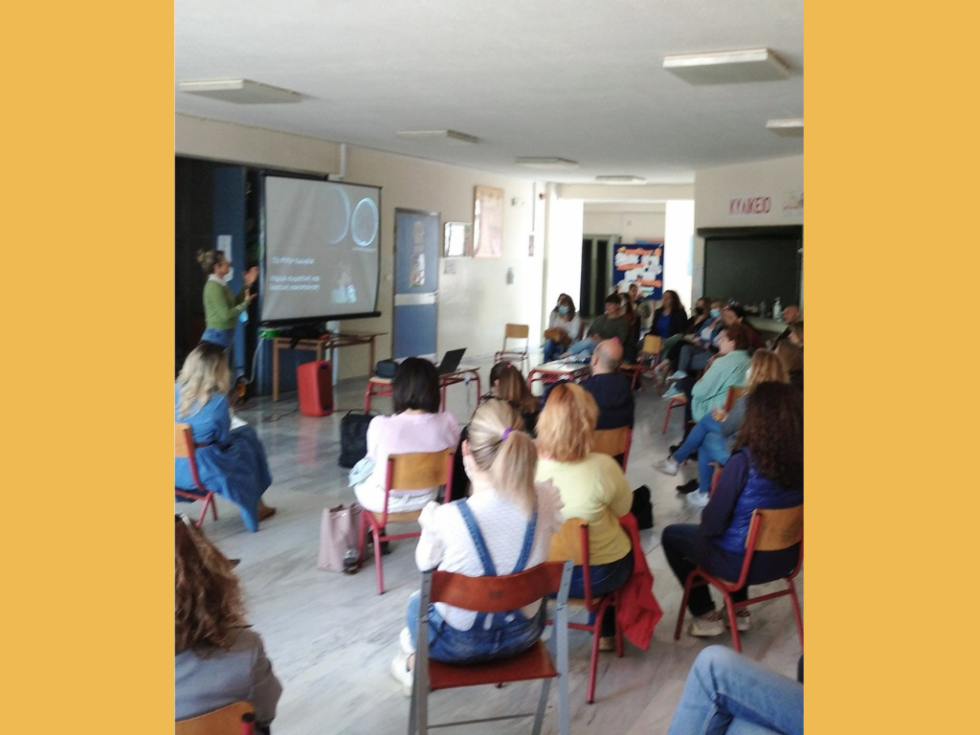
Screen Time: Empowering Parents May Be The Key
GUEST WRITER: Dimitra Gounari is a certified Parent Coach who is currently based in Thessaloniki, Greece. She works with individuals and schools to support parents in positively responding to external pressures on family life, such as technology and screen time. In this article she talks about:
- a large-scale longitudinal study on the impact of too much screen time on kids’ brains.
- how parents can re-frame how they approach the conflict they have with their kid/kids over too much screen time to help restore balance in the home environment.
- empowering parents to co-create meaningful off-screen activities for connecting with their kid/kids in a way that allows the child to feel seen and heard.
As a coach trained and certified by The Parent Coaching Institute, Dimitra values co-constructing effective strategies when working with parents. She shares an example of her work co-constructing activities with the parents of a 13-year-old at the end of this article where you can see how she puts her values into action.
TOO MUCH SCREEN TIME AND THE ABCD STUDY
Parents and children are facing new and consistently changing digital and screen time dilemmas. Screen time among children has been on the rise, especially during the pandemic.
The children we are raising are living in the most transforming digital world, interacting with the most advanced technological innovations in History to date. They will in turn go on to innovate further in the field of technology.
At the same time, science provides us with evidence-based resources about the negative aspects of screen exposure. Too much screen time can lead to obesity, sleep problems, depression, anxiety, and lower school performance. The ABCD Study is the largest long-term study of brain development and child health in the United States. Launched in 2015, the ABCD study is following 11,750 children, including 2,100 who are twins or triplets, for at least 10 years starting at ages 9 to 10. More than 32 research papers have been published using the ABCD study data. In one of the study’s research papers, the National Institutes of Health (NIH) found that children who spent more than two hours a day on screen-time activities scored lower on language and thinking tests. Furthermore, some children who spent more than seven hours a day of screen-time activities demonstrated thinning of the brain’s cortex, which is the area of the brain related to critical thinking and reasoning.
CONFLICTS OVER SCREEN TIME: WHAT CAN PARENTS DO?
Initially, the most crucial question for caregivers seems to be “How much screen time is okay, according to age?” It is common for parents and caregivers to restrict their kid’s screen limits. However, there doesn’t yet seem to be a consensus among experts and researchers with regard to this question of how much screen time is bad for kids’ healthy development, especially for kids ages 6+. Even the AAP’s recommendations, which are the most legitimate guidelines we’ve got as parents, still don’t describe time-based limits. So the stress for the parents around this unanswered question remains: “How much time?”
But is it really a matter of time? Is the negative aspect of screen exposure a matter of inefficient boundaries? Are screen limits the way digital literate families handle screen time?
My experience of working with parents made it obvious to me that time-focused solutions have no results. On the contrary, they may be a big source of conflicts in the family leading to disconnection.
What I try to communicate during my coaching sessions with parents is to reframe the question from “How much screen time?” to “How much time we devote to appropriate cognitive, emotional, and social development activities in our digital life?” Parents can boost their child’s cognitive, social and emotional development through everyday interactions such as talking, reading, and playing together. This is particularly important for toddlers. These simple and everyday activities, however, play a crucial role not only in toddlers but also in teenagers. As our kids grow up, they still need affection and respectful interaction with their parents so as to build their self-confidence.
SCREEN TIME: WHAT IS IN YOUR CHILD'S BEST INTEREST?
We cannot change the technology culture, but we can support parents to create an environment that takes into consideration their child’s emotional, cognitive and social needs. That’s why I find it very important in my work as a parent coach to open up new possibilities by increasing off-screen time spent with parents/friends and other activities.
Questions I ask my clients to support them in this area include:
- What is your child curious about?
- What does your child love doing? How can you support him/her in doing more of that?
- How can you offer your child more playtime with you or with friends?
SCREEN TIME: GUIDING RATHER THAN IGNORING
We have to gain clarity and knowledge about the media/digital issues. We need to accept their influence and always take into consideration the potential danger. But if we want to navigate our child in the digital river, we need to know more than they do about the research updates on screen time.
I suggest to parents that they offer guidance to their children about what kind of online content and appropriate screen-based activities they can have. I recognize how difficult it is for us, but it’s hard to support our children rather than choosing to ignore important digital tools, gadgets, and applications.
THE ROLE OF CONNECTION
Last but not least, it is crucial to understand that children need us to be present, authentic and connected with them. When we get angry about screen time or we discuss it with disrespect, we take steps towards the opposite direction – that of disconnection.
Whatever your child’s relationship with their electronic devices, I encourage you to enrich the family environment with activities that promote the off-screen connection between family members. This will improve your communication with your child. Examples include committing to engaging in more face-to-face conversation, having dinner together, and connecting by having a winding down/sleep routine such as reading a book together.
ENCOURAGING DIGITAL SOCIAL SKILLs
We cannot have total control over what our child will be exposed to online, especially as he/she grows up. When we have an open, trustful relationship with our child we lead by example and inspire social skills and boundaries.
In my coaching sessions, I encourage parents to support their child so as to understand screens and media. How do they work? How does technology support our life? How many things have changed during the last century?
Digital literacy is so important in our world, and we can guide our children with questions that promote critical thinking. Invite them to think in an out-of-the-box way about the content and the information they share on digital platforms.
AN INSPIRING STORY
K. and C. called me desperate about their younger daughter, 13 years old, and her screen habits. She was a very strongly-opinionated girl and was triggering the limits of her parents’ patience. When we started our journey, she spent many hours on her mobile talking with her friends, staying awake many hours and experiencing sleep difficulties. She had a high conflict relationship with her parents, and the parents felt like they cannot do anything about that. Her parents blamed her screen time and screen habits, finding ways to enforce daily routines with screen limitations.
During our coaching journey, K. and C. acknowledged the real challenge, which was to reconnect with their daughter, regardless of the screen time issue. How could they regain their bond with her? What were their child’s current interests?
We co-constructed activities that combined her interest in social media and her parents’ presence. We also discovered other (screen-free) activities and encouraged her participation:
- The mother and daughter co-created an Instagram account for her mother’s job
- Both parents started asking their child questions about what interested her on screen
- Both parents encouraged their daughter to improve her swimming skills and supported her as she pursued of her swimming goals
Taking one step at a time, the daughter felt the care and compassion that her parents were giving, and she started to reconnect with them. They spent more time together, and she was sharing her interests with them without feeling judged about her choices. She experienced acceptance from her parents and their relationship was transformed. If we change the question, we change the way we see our relationship with our child.
As I say to the parents in my workshops: “It is easy to shut down screens. But are we ready to replace them with activities and moments which promote healthy emotional and cognitive development?”
CLIENT TESTIMONIALS
- “…Dimitra supported me in everything …She gave me strength every time I couldn’t manage a situation … She taught me so many beautiful things that I kept everything inside me… building a relationship of love and trust with my child! Thank you for everything my Dimitra and continue what you are doing, making happy other families too! … “- Dimitra, mother of a 3-year-old son
- “…Dimitra is an intelligent professional who can read your thoughts, and she excels in that! I consider myself and my family very lucky we found you !!! We can’t wait to meet you in person next time we visit Greece!!!”- Matina, mother of a 3.5-year-old
- “I do not just recommend the service, for me Parent Coaching is Dimitra Gounari” – Helen, mother of two, 1.5 and 6 years old
REFERENCES
ABOUT THE AUTHOR

Dimitra Goundari is a Parent Coach, certified by the Parent Coaching Institute. The Parent Coaching Institute values co-constructing effective evidence-based strategies with parents so they can positively respond to external pressures (such as media stressors and the high stress of today’s world that affect a home environment). Dimitra is a mother of two children and marathon runner. Her services for individuals include 1-to-1 coaching, couple coaching, group coaching, and seminars / workshops / lectures on topics such positive parenting, parent’s self-care, and work-life balance. She also works with organizations and companies that strive to provide their employees with the support they need to succeed both as parents and professionals.



